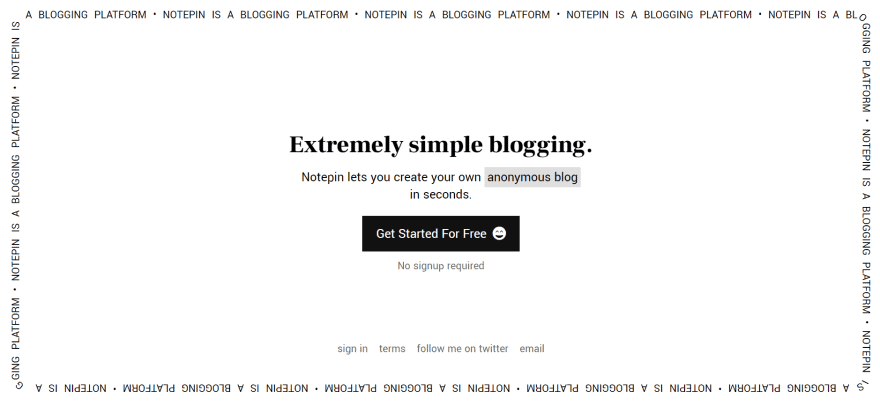In this digital age, it’s become increasingly important for individuals to protect their privacy while expressing themselves online.
Anonymous blogs offer a platform for people to share their thoughts, ideas, and experiences without the fear of judgment or retaliation.
In this guide, we’ll walk you through the steps to create and maintain a successful anonymous blog.
Reasons to start an anonymous blog
Some of the motivations behind starting an anonymous blog:
- Personal expression without fear of judgment: An anonymous blog allows you to express yourself freely without worrying about friends, family, or colleagues judging you.
- Protection from retaliation: Discussing sensitive topics or controversial opinions can sometimes lead to a backlash. Anonymity provides a layer of protection.
- Experimentation with different writing styles: An anonymous blog is an excellent opportunity to experiment with new writing styles and ideas without impacting your existing professional reputation.
- Maintaining a professional image: Separating your personal life from your professional life is essential for some careers. An anonymous blog can help you achieve that balance.
Choosing a blogging platform

There isn’t really a good number of blogging platforms made for anonymous blogging, but there are measures you can take while using some of the most popular blogging sites.
Here are some popular options:
- WordPress.org: Host this on a VPS hosting service, but make sure not to use self-identifying info when signing up for your web hosting service.
- Blogger: Owned by Google, Blogger is another free platform that allows users to blog anonymously. However, it requires a Google account, so you may want to create a new, anonymous account for this purpose.
- Medium: Known for its minimalist design, Medium offers a platform for writers to share their thoughts and stories. While it’s not specifically designed for anonymous blogging, you can sign up using a pseudonym and a separate email address.
Another option is to use a hosted blogging solution that is made specifically for anonymous blogging. Examples include:
- Telegra.ph
- Write.as
- Txt.fyi
- Notepin.co
- Ghost.org
Key features to look for in a blogging platform:
- Privacy settings
- Customization options
- Ease of use
- Cost
You can register your blog using Bluehost, an affordable web hosting solution.
Creating an anonymous identity
Crafting a believable pseudonym and backstory for your anonymous persona is essential.
Choosing a pseudonym:
- Avoid using your real name or any identifiable information.
- Make sure the pseudonym is unique and doesn’t point back to you.
- Consider using a name generator for inspiration.
Creating a backstory for your anonymous persona:
- Develop a brief, fictional background for your character.
- Ensure that your persona’s backstory doesn’t resemble your real life too closely.
- Keep your persona consistent across all platforms.
Tip: Use an AI tool like Jasper AI to create your unique personal anonymous persona and back story.
Buying a domain name and web hosting anonymously
Purchasing a domain name and web hosting anonymously can be an essential step in maintaining your blog’s privacy. By doing so, you prevent your personal information from being publicly available through the WHOIS database, which stores registrant details for domain names. Here’s how you can buy a domain name anonymously:
a) Choose a domain registrar with privacy features
Not all domain registrars offer privacy protection services. Select a reputable registrar that provides domain privacy or WHOIS privacy protection. Some popular domain registrars with privacy features include:
b) Use an anonymous email address
Create a new email address specifically for your anonymous blog, domain registration, and web hosting subscription. Make sure this email is not connected to your personal information or other online accounts. Consider using a privacy-focused email provider like ProtonMail or Tutanota.
c) Enable domain privacy or WHOIS privacy protection
When registering your domain, enable domain privacy or WHOIS privacy protection (sometimes referred to as “private registration”).
This feature masks your personal information with the registrar’s details, keeping your identity hidden in the WHOIS database. Some registrars offer this service for free, while others may charge a small fee.
d) Pay anonymously
To maintain anonymity during the payment process, consider using anonymous payment methods such as:
- Cryptocurrencies: Bitcoin, Ethereum, or other cryptocurrencies are widely accepted by many domain registrars and provide a higher level of privacy.
- Prepaid debit cards: Purchase a prepaid debit card with cash to avoid linking your bank account or credit card to the domain registration.
- Payment intermediaries: Use privacy-focused payment intermediaries like Privacy.com to create virtual cards that mask your personal information.
e) Use a VPN or proxy server
When registering your domain, use a VPN or proxy server to hide your IP address and location. This extra layer of privacy can protect you from potential tracking or monitoring.
f) Get web hosting
Set up anonymous payment
To keep your financial information private, choose a web hosting provider that supports anonymous payment methods. Options include:
- Cryptocurrencies (e.g., Bitcoin, Ethereum, or Monero)
- Prepaid debit cards or gift cards
- Payment services like PayPal, using an anonymous email address
You can use any web hosting service you like, but we recommend Bluehost as it is affordable. You can opt for VPS hosting and a dedicated IP address for more protection.
By following these steps, you can purchase a domain name and web hosting anonymously and ensure your personal information remains hidden from the public. This is a crucial aspect of maintaining your blog’s privacy and protecting your identity.
Ensuring privacy and security
To protect your anonymity, follow these steps:
- Use VPNs and proxy servers: Virtual Private Networks (VPNs) and proxy servers help to hide your location and IP address.
- Email and password security: Create a new email address just for your blog, and use a strong password.
- Managing social media presence: If you have separate social media accounts for your anonymous persona, avoid using the same usernames, profile pictures, or identifiable information.
- Avoiding personal information leaks: Be cautious when sharing personal anecdotes or experiences that could be traced back to you.
Enhancing blog anonymity with generative AI tools
Leveraging generative AI tools can help you maintain anonymity and add an extra layer of protection to your blog. These tools can generate content, create images, and even help you respond to comments without exposing your writing style or personal information.
AI-generated content
Generative AI tools, such as OpenAI’s GPT models, ChatGPT, Jasper AI, etc. can create unique content for your blog. These tools can help you:
- Generate ideas or topics for blog posts.
- Write drafts or complete articles based on your input.
- Edit or revise existing content to make it more engaging.
While using AI-generated content, ensure that it aligns with your blog’s theme, tone, and style. Always review and edit the content to maintain your anonymous persona and make the content relatable to your audience.
AI-generated images
Creating custom visuals is essential for a successful blog. AI tools can help you generate images that:
- Enhance the visual appeal of your blog posts.
- Maintain a consistent visual style across your blog.
- Replace stock photos or images that might be traced back to you.
Some popular AI-generated image tools include
- Jasper Art
- Night Cafe
- Midjourney
- Stable Diffusion
- RunwayML, and
- DALL-E.
You can also create unique profile photos for your bio and social media profile photos using AI image generators.
AI-generated responses
Engaging with your audience is crucial for building a community around your blog. Generative AI tools can help you:
- Respond to comments and emails while maintaining your anonymous persona.
- Automate repetitive tasks, like filtering spam comments or answering frequently asked questions.
- Generate unique and engaging responses that foster interaction with your readers.
Remember to review and personalize AI-generated responses to ensure they align with your anonymous persona and provide value to your readers.
By incorporating generative AI tools into your blogging strategy, you can enhance your blog’s anonymity and create engaging content while minimizing the risks associated with revealing your true identity.
Tips for using generative AI tools
- Customize AI-generated content: Edit and tailor the AI-generated content to your blog’s style and voice, while ensuring it doesn’t resemble your own too closely.
- Avoid over-reliance: While AI tools can be helpful, it’s essential to maintain a balance between AI-generated and your original content. This keeps your blog authentic and engaging.
- Stay informed about AI developments: As AI technology evolves, new tools and features will become available. Keep an eye on emerging trends to make the most of these advancements for your anonymous blog.
Writing compelling anonymous content
To engage readers, focus on the following:
- Understanding your target audience: Identify your intended readership and tailor your content to their interests and preferences.
- Developing a unique voice and style: Experiment with writing styles and develop a distinctive voice for your anonymous persona.
- Balancing anonymity and relatability: While maintaining anonymity, make sure to create content that readers can relate to and connect with.
- Creating engaging headlines and formatting: Craft attention-grabbing headlines and use formatting (like headings, subheadings, bullet points, and italics) to make your content easy to read and visually appealing.
Building an audience for your anonymous blog
To grow your blog’s readership, consider the following strategies:
- Utilizing social media platforms: Share your content on social media using your anonymous persona, but be cautious about revealing personal information.
- Engaging with your readers through comments and emails: Respond to comments and emails to build relationships with your readers and foster a sense of community.
- Participating in blogging communities and forums: Join online blogging communities to learn from others, share your content, and gain visibility.
Monetizing your anonymous blog
To generate income from your anonymous blog, explore these options:
- Affiliate marketing: Join affiliate programs to promote products or services related to your niche, earning a commission for each sale or lead.
- Sponsored content: Collaborate with companies to create sponsored posts, reviews, or ads on your blog in exchange for payment.
- Selling digital products: Create and sell digital products like e-books, courses, or printables related to your blog’s niche.
- Setting up a Patreon or donation system: Invite your readers to support your blog through a platform like Patreon or by making direct donations.
Legal considerations for anonymous bloggers
Be aware of the following legal concerns:
- Understanding defamation and libel laws: Ensure your content doesn’t defame or libel anyone, as you could be held legally responsible.
- Protecting intellectual property: Always credit original sources, respect copyright laws, and avoid plagiarism.
- Respecting others’ privacy: Do not share private information about others without their consent, even when blogging anonymously.
Maintaining anonymity over time
To preserve your anonymity, follow these guidelines:
- Regularly reviewing security measures: Update your security practices as needed and stay informed about online privacy best practices.
- Evolving your anonymous persona: As you grow as a writer and blogger, allow your anonymous persona to evolve, but ensure consistency across your platforms.
- Managing burnout and mental health: Anonymous blogging can be isolating. Be mindful of your mental health and reach out for support when needed.
Conclusion
Starting an anonymous blog can be a fulfilling and liberating experience. By following the steps outlined in this guide, you’ll be well on your way to creating a successful and secure anonymous blog. So go ahead, unleash your creativity, and share your unique perspective with the world!


